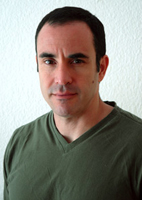
Feature Story
Leadership and AIDS: Gregg Gonsalves
09 May 2008
09 May 2008 09 May 2008
Gregg has been working on
behalf of people living with
HIV since 1990 when he
joined ACT UP in the United
States.
One needs to look no further than to Gregg Gonsalves as an example of leadership in AIDS.
His unswerving commitment to accelerating access to HIV treatment to those most in need and to improving HIV-related human rights, combined with his constant drive for clarity and transparency within the many institutions engaged in AIDS work has no doubt helped improve the lives of many.
Gregg has been working on behalf of people living with HIV since 1990 when he joined ACT UP (AIDS Coalition to Unleash Power) in the United States. In the early nineties, very little was understood about how the virus worked or how the immune system was damaged by it and there were no effective treatments to counter the progress of the disease. Most discussion about AIDS was taking place in the domain of the scientific community.
In search for answers that could bring advances in treatment for people around them dying as a result of AIDS, Gregg and other activists in ACT UP began to attend meetings of AIDS Clinical Trials Group (ACTG) researchers and other scientific fora.
He was drawn into scientific research, in spite of studying studied Russian Language and Literature and English at University, immersing himself in the latest scientific papers and journals in order to be able to have a dialogue with the virologists and basic scientists and pharmacists.
Agents of change
This group of United States based activists was the first to stand up and insist that they have a role to play as people living with HIV and demand the drugs needed to save their lives, the information to know how to use them and how to advocate for them.
Gregg and others determinedly lobbied the scientific community, the pharmaceutical industry and politicians and got results. In many ways today’s global AIDS advocacy movement has some of its roots in the culture that was created by this movement. It spawned the idea of a global public health movement based on the needs of people with the disease.
The AIDS landscape is very different today. Almost two decades later the epidemic has grown and 33 million people across the globe are living with HIV. Progress has been made in developing antiretroviral therapy that can slow down the progression of AIDS. However, access to this treatment, as well as to other prevention and care services, continues to be beyond the reach of many millions of people.
Passionate defender of rights
Today, Gonsalves continues to work to improve people’s access to HIV treatment in Southern Africa, as regional coordinator of AIDS and TB treatment literacy and advocacy programmes for the AIDS and Rights Alliance of Southern Africa (ARASA). In this region alone more than a third of last year’s new HIV infections and AIDS-related deaths occurred. ARASA’s mission is to promote a human rights approach to HIV in Southern Africa through capacity building and advocacy.
“Gregg is a formidable advocate and leader who has brought much-needed energy and passion to AIDS responses in North America, globally and now, in his current position, across Southern Africa,” said Andy Seale, UNAIDS Eastern and Southern Africa Senior Regional Adviser, Advocacy, Communications and Information.
“He and many other leaders like him in civil society have an important role to help ensure that all stakeholders remain alert, increasingly accountable to the people most affected by this epidemic and ready to respond to the many challenges ahead.”
Gregg is also a founding member of the International Treatment Preparedness Coalition, a network of more than 1000 people from 125 countries advocating for universal access to HIV/AIDS and TB treatment.
The John M. Lloyd Foundation recently selected Gregg as the first-ever recipient of the $100,000 John M. Lloyd AIDS Leadership Award. It is a fitting recognition for this AIDS leader.
Leadership and AIDS: Gregg Gonsalves
Feature stories:
Leadership and AIDS: Patricia Pérez (8 April 2008)
External links:
New John M. Lloyd AIDS Leadership Award Recognizes Visionary Advocate (27 March 2008)
AIDS and Rights Alliance of Southern Africa



